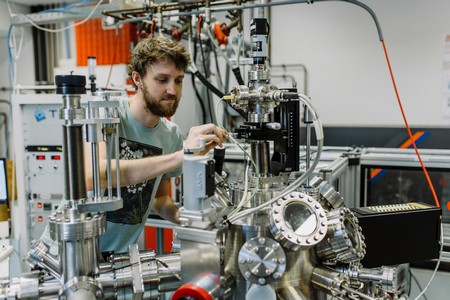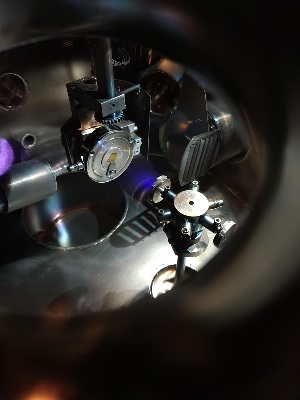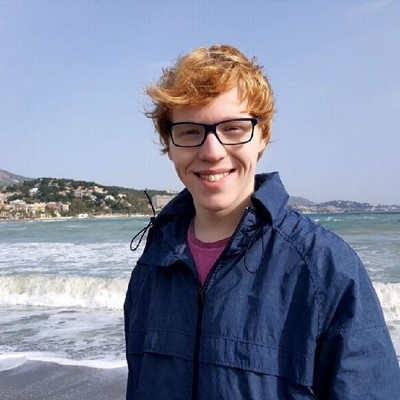The best of two worlds
The University of Groningen research centre CogniGron aims to develop a novel type of computer that is inspired by the brain. A lot of fundamental research on new materials and new technologies for this ‘neuromorphic computing’ is being conducted. Yet CogniGron won’t be producing any computer chips. That is why the centre is collaborating with companies such as IBM. The IBM PhD Fellowship is a clear example of such a collaboration: two students enrolled in this programme, which provides them with the opportunity to work in Groningen and at the IBM Research Institute in Zürich, Switzerland.
Ruben Hamming-Green was the first IBM Fellow, he started in November 2019 at the University of Groningen and spent four months in Switzerland during the summer of 2020. He is looking forward to another few months at IBM Zürich later this year. ‘I am making thin films of novel materials that could be used in neuromorphic computers. The production and initial assessment both take place in Groningen. I then take the thin films to Zürich, where I can use them in real devices.’

Materials science
Ruben applied for the IBM Fellowship programme because he wanted to do a PhD with his Master’s thesis supervisor Beatriz Noheda, the scientific director of CogniGron. ‘I was also looking for a position that would bring me into contact with research outside academia. I didn’t fancy a university career.’ Ruben, who grew up in New Mexico, USA, studied physics at the University of Groningen and took the Top Master’s programme in Nanoscience there as well. ‘My mother is Dutch,’ he explains his choice for the Netherlands. ‘And I came to Groningen specifically because of the Zernike Institute, as I was primarily interested in materials science.’
Jesse Luchtenveld, the second IBM Fellow, also completed his Bachelor’s degrees in Applied Physics and Computing Science at the University of Groningen, where he joined the Honours Programme. ‘I wasn’t looking for a PhD position just yet but my supervisor, Professor Bart Kooi, offered me a place and I took it.’ He is fascinated by physics. ‘I really like how you can use fundamental knowledge to create something that has never existed before.’ He is also producing thin films—in his case, of a phase change material. ‘This can be switched between two phases that have different properties. In that way, it is possible to encode information.’

Equipment
He started in March 2021 and after a year in Groningen making his films, he is now in Zürich to further characterize their potential. This is one advantage of working in two different institutes. At the University of Groningen, there is advanced equipment to make thin films using pulsed laser deposition. But the devices that they can build here are relatively large, whereas IBM Zürich has equipment for miniaturization. Therefore, Jesse and Ruben can make devices there that are more like real computer parts.
And it is not just the hardware that is complimentary. Working in an industrial environment is a bit different as well. ‘In Groningen, I would see my supervisor perhaps once every two weeks,’ says Jesse. ‘Here, we meet twice a week.’ Ruben finds the work more focused in Zürich: ‘And faster paced. In Groningen, there is more individual work, whereas at IBM people work more in small teams.’ Part of this difference can be explained by the nature of the projects: purely fundamental in Groningen and more applied in Zürich. Ruben: ‘We basically already understand the stuff that we work on at IBM.’ However, both also agree that IBM Zürich is a true research institute and as such, there are more similarities than differences compared to CogniGron. Jesse: ‘I think that there are a couple of dozen PhD students here at any given time.’

Lunch
Of course, working in a different country highlights cultural differences beyond science. Having lived in Groningen for a long time, both Ruben and Jesse miss their bikes when in Zürich. Cycling is not common there and, as a result, not as safe as in the Netherlands. This is made up for by the much better hiking opportunities offered by the Swiss Alps. Another difference that Jesse noted is in the approach to eating lunch. His first impression is that it is more of a group activity in Switzerland, whereas in Groningen many will just grab a sandwich behind their desk. But Ruben sees less of a difference: ‘My group in Groningen also always went out to lunch together.’
So, how do they see their futures? Both are keeping their options open. Ruben already mentioned that he doesn’t aspire to an academic career. ‘And in general, careers in neuromorphic computing are rare.’ But the skills that they are learning are more general, such as the experimental techniques, as are the creative challenges and the dedication that is needed to obtain results. Doing all this in two different settings makes their work very rewarding. Jesse: ‘And to me, physics is everything.’
More information on CogniGron on the University of Groningen website
More news
-
10 February 2026
Why only a small number of planets are suitable for life
-
09 February 2026
Can we make the earth spin in the opposite direction?

